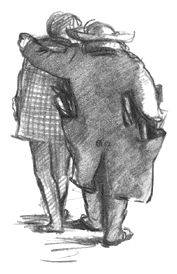Vie de Boheme

(10 of 24)
How the Bohemian Club was Founded
After reading to the end of this epistle, which the artist had written in the office of a friend employed at the War Department, M. Bernard crumpled it up in a rage. His glance falling on old Durand, who was waiting for the promised gratuity, he brutally asked him what he was doing there.
“I’m waiting, sir.”
“For what?”
“Why, sir, for your gracious kindness … because of the good news,” the janitor stammered.
“Get out! What do you mean, rascal, by standing in front of me with your cap on?”
“But sir…”
“Come, no answering back, get out! … or rather, no, stay here. We’re going to visit the room of this scoundrelly artist who moves out without paying me.”
“What? M. Schaunard?
“Yes.” The landlord’s anger was rising. “And if he has taken away the slightest thing you are dismissed, do you understand? You are dismissed!”
“But that’s impossible, it is,” muttered the poor janitor. “M. Schaunard has not moved out. He’s gone to fetch the money to pay you, sir, and to order the cart to take away his furniture.”
“Take away his furniture! Hurry! I’m sure he’s doing it now. He’s laid a trap, to get you away from your lodge while he plays this trick, idiot that you are!”
“Heavens, idiot that I am!” Old Durand trembled before the Olympian wrath of his employer, who dragged him out on to the staircase. When they reached the yard, the janitor was accosted by the young man in the white hat.
“Come now, janitor,” he exclaimed, “am I, or am I not, soon to be given possession of my domicile? Is today April the eighth, or is it not? Have I, or have I not, engaged the apartment, and have I not given you the earnest-money? Yes or no?”
“Excuse me, sir,” said the landlord, “I am at your service … Durand,” he said to the janitor, “I shall attend to this gentleman myself. Run upstairs. That scoundrel Schaunard has doubtless returned to do his packing. If you find him at it, lock him in, and go fetch the police.” Old Durand vanished up the stairs.
“Excuse me, sir,” said the landlord, bowing to the young man. “Whom have I the honour of addressing?”
“I am your new tenant, sir. I have engaged a room on the sixth floor of this house, and am becoming impatient that it is not vacant.”
“I’m extremely sorry, sir. A difficulty has arisen between me and one of my tenants, the one whom you are to replace.”
“Sir, sir!” the janitor called, from a window in the top storey. “M. Schaunard is not here. But his room is still here. Idiot that I am, I mean, he has taken nothing away – not a hair, sir.”
To be continued …
[Vie de Bohème by Henry Mürger, a vivid portrait of the ‘Bohemian’ life of the artistic quarter of
Leave a Response
You must be logged in to post a comment.

